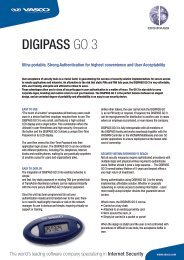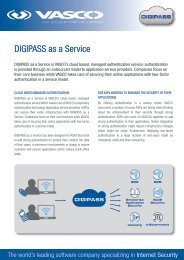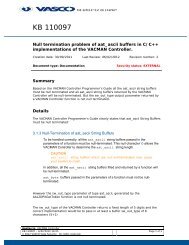Annual Report 2009 (1 MB, pdf) - Vasco
Annual Report 2009 (1 MB, pdf) - Vasco
Annual Report 2009 (1 MB, pdf) - Vasco
Create successful ePaper yourself
Turn your PDF publications into a flip-book with our unique Google optimized e-Paper software.
Future issuances of blank check preferred stock may reduce voting power of common stock and may have<br />
anti-takeover effects that could prevent a change in control.<br />
Our corporate charter authorizes the issuance of up to 500,000 shares of preferred stock with such<br />
designations, rights, powers and preferences as may be determined from time to time by our Board of Directors,<br />
including such dividend, liquidation, conversion, voting or other rights, powers and preferences as may be<br />
determined from time to time by the Board of Directors without further stockholder approval. The issuance of<br />
preferred stock could adversely affect the voting power or other rights of the holders of common stock. In<br />
addition, the authorized shares of preferred stock and common stock could be utilized, under certain<br />
circumstances, as a method of discouraging, delaying or preventing a change in control.<br />
Risks Related to Technology and Intellectual Property<br />
Technological changes occur rapidly in our industry and our development of new products is critical to<br />
maintain our revenue.<br />
The introduction by our competitors of products embodying new technologies and the emergence of<br />
new industry standards could render our existing products obsolete and unmarketable. Our future revenue growth<br />
and operating profit will depend in part upon our ability to enhance our current products and develop innovative<br />
products to distinguish ourselves from the competition and to meet customers’ changing needs in the data<br />
security industry. We cannot assure you that security-related product developments and technology innovations<br />
by others will not adversely affect our competitive position or that we will be able to successfully anticipate or<br />
adapt to changing technology, industry standards or customer requirements on a timely basis.<br />
Our products contain third-party, open-source software and failure to comply with the terms of the<br />
underlying open-source software licenses could restrict our ability to sell our products or otherwise result<br />
in claims of infringement.<br />
Our products are distributed with software programs licensed to us by third-party authors under “opensource”<br />
licenses, which may include the GNU General Public License (GPL), the GNU Lesser Public License<br />
(LGPL), the BSD License and the Apache License. These open-source software programs include, without<br />
limitation, Linux, Apache, Openssl, IPTables, Tcpdump, Postfix, Cyrus, Perl, Squid and Snort. These third-party,<br />
open-source programs are typically licensed to us for no fee and the underlying license agreements generally<br />
require us to make available to users the source code for such programs, as well as the source code for any<br />
modifications or derivative works we create based on these third-party, open-source software programs.<br />
We do not believe that we have created any modifications or derivative works to, an extended version<br />
of, or works based on, any open-source software programs referenced above. We include instructions to users on<br />
how to obtain copies of the relevant open-source code and licenses.<br />
We do not provide end users a copy of the source code to our proprietary software because we believe<br />
that the manner in which our proprietary software is aligned or communicates with the relevant open-source<br />
programs does not create a modification, derivative work or extended version of, or a work based on, that opensource<br />
program requiring the distribution of our proprietary source code.<br />
Our ability to commercialize our products by incorporating third-party, open-source software may be<br />
restricted because, among other reasons:<br />
• the terms of open-source license agreements are unclear and subject to varying interpretations,<br />
which could result in unforeseen obligations regarding our proprietary products or claims of<br />
infringement;<br />
• it may be difficult to determine the developers of open-source software and whether such licensed<br />
software infringes another party’s intellectual property rights;<br />
22


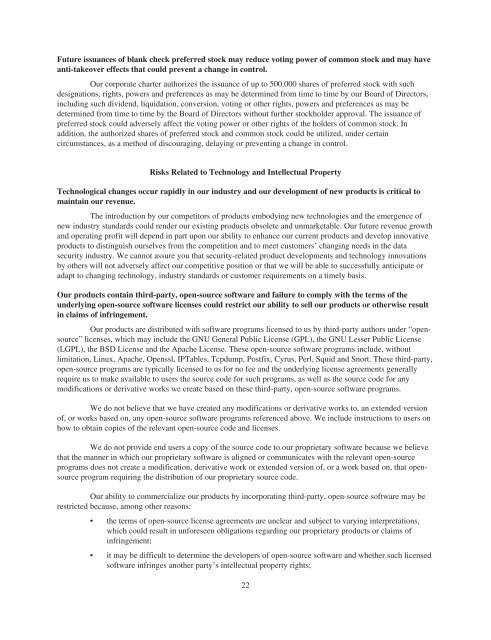
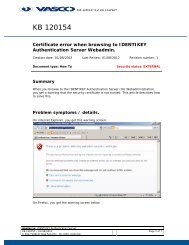


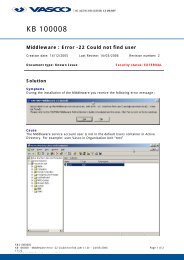

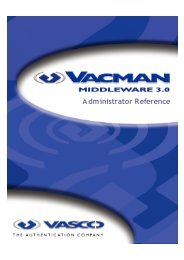
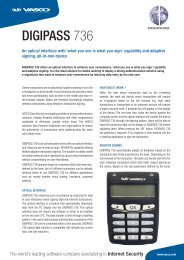
![KB [100006] - Vasco](https://img.yumpu.com/12539350/1/184x260/kb-100006-vasco.jpg?quality=85)


